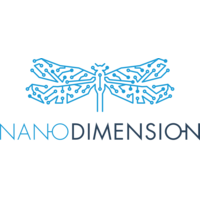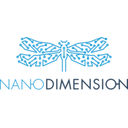
Nano Dimension Ltd
NASDAQ:NNDM


| US |

|
Johnson & Johnson
NYSE:JNJ
|
Pharmaceuticals
|
| US |

|
Berkshire Hathaway Inc
NYSE:BRK.A
|
Financial Services
|
| US |

|
Bank of America Corp
NYSE:BAC
|
Banking
|
| US |

|
Mastercard Inc
NYSE:MA
|
Technology
|
| US |

|
UnitedHealth Group Inc
NYSE:UNH
|
Health Care
|
| US |

|
Exxon Mobil Corp
NYSE:XOM
|
Energy
|
| US |

|
Pfizer Inc
NYSE:PFE
|
Pharmaceuticals
|
| US |

|
Palantir Technologies Inc
NYSE:PLTR
|
Technology
|
| US |

|
Nike Inc
NYSE:NKE
|
Textiles, Apparel & Luxury Goods
|
| US |

|
Visa Inc
NYSE:V
|
Technology
|
| CN |

|
Alibaba Group Holding Ltd
NYSE:BABA
|
Retail
|
| US |

|
3M Co
NYSE:MMM
|
Industrial Conglomerates
|
| US |

|
JPMorgan Chase & Co
NYSE:JPM
|
Banking
|
| US |

|
Coca-Cola Co
NYSE:KO
|
Beverages
|
| US |

|
Walmart Inc
NYSE:WMT
|
Retail
|
| US |

|
Verizon Communications Inc
NYSE:VZ
|
Telecommunication
|
Utilize notes to systematically review your investment decisions. By reflecting on past outcomes, you can discern effective strategies and identify those that underperformed. This continuous feedback loop enables you to adapt and refine your approach, optimizing for future success.
Each note serves as a learning point, offering insights into your decision-making processes. Over time, you'll accumulate a personalized database of knowledge, enhancing your ability to make informed decisions quickly and effectively.
With a comprehensive record of your investment history at your fingertips, you can compare current opportunities against past experiences. This not only bolsters your confidence but also ensures that each decision is grounded in a well-documented rationale.
Do you really want to delete this note?
This action cannot be undone.

| 52 Week Range |
2.04
2.95
|
| Price Target |
|
We'll email you a reminder when the closing price reaches USD.
Choose the stock you wish to monitor with a price alert.

|
Johnson & Johnson
NYSE:JNJ
|
US |

|
Berkshire Hathaway Inc
NYSE:BRK.A
|
US |

|
Bank of America Corp
NYSE:BAC
|
US |

|
Mastercard Inc
NYSE:MA
|
US |

|
UnitedHealth Group Inc
NYSE:UNH
|
US |

|
Exxon Mobil Corp
NYSE:XOM
|
US |

|
Pfizer Inc
NYSE:PFE
|
US |

|
Palantir Technologies Inc
NYSE:PLTR
|
US |

|
Nike Inc
NYSE:NKE
|
US |

|
Visa Inc
NYSE:V
|
US |

|
Alibaba Group Holding Ltd
NYSE:BABA
|
CN |

|
3M Co
NYSE:MMM
|
US |

|
JPMorgan Chase & Co
NYSE:JPM
|
US |

|
Coca-Cola Co
NYSE:KO
|
US |

|
Walmart Inc
NYSE:WMT
|
US |

|
Verizon Communications Inc
NYSE:VZ
|
US |
This alert will be permanently deleted.
 Nano Dimension Ltd
Nano Dimension Ltd
Nano Dimension Ltd
Nano Dimension Ltd. engages in the provision of intelligent machines for the fabrication of additively manufactured electronics. With its 3D printing technology for printed electronics, the Company targets the growing demand for electronic devices that require sophisticated features and rely on encapsulated sensors, antennas and printed circuit boards (PCBs). The firm's PCB Jet printer system is an inkjet deposition tool for printing multi-layer circuit boards at home or office. The company uses hardware, software, print-head management and nano-chemistry for Research and Development (R&D), prototyping and custom manufacturing projects. The firm targets a range of industry sectors, such as consumer electronics, medical devices and defense, aerospace, automotive, Internet of Things (IoT) and telecom.

Nano Dimension Ltd. engages in the provision of intelligent machines for the fabrication of additively manufactured electronics. With its 3D printing technology for printed electronics, the Company targets the growing demand for electronic devices that require sophisticated features and rely on encapsulated sensors, antennas and printed circuit boards (PCBs). The firm's PCB Jet printer system is an inkjet deposition tool for printing multi-layer circuit boards at home or office. The company uses hardware, software, print-head management and nano-chemistry for Research and Development (R&D), prototyping and custom manufacturing projects. The firm targets a range of industry sectors, such as consumer electronics, medical devices and defense, aerospace, automotive, Internet of Things (IoT) and telecom.





























 You don't have any saved screeners yet
You don't have any saved screeners yet
